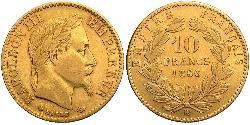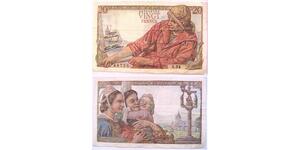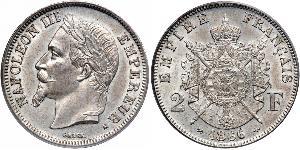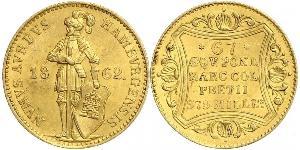20 Franc (Verkauft für $275.0)
1866, France (2nd Empire), Napoleon III. Beautiful Gold 20 Francs Coin. 6.47gm!
Mint Year: 1866
Condition: A nice AU+
Denomination: 20 Francs
Mint Place: Strasbourg (BB)
Reference: Friedberg 532 , KM-801.2.
Material: Gold (.900)
Diameter: 21mm
Weight: 6.47gm
Obverse: Laureated head on Napoleon III right. Privy mark and s designer's signature (BARRE) below.
Legend: NAPOLEON III EMPEREUR
Reverse: Arms of the Bonaparte Dynasty, splitting value (20-FR).
Legend: EMPIRE FRANCAIS (BB) 1866 (anchor)
The Second French Empire or Second Empire was the Imperial Bonapartist regime of Napoleon III from 1852 to 1870, between the Second Republic and the Third Republic, in France.
Napoleon III, also known as Louis-Napoleon Bonaparte (full name Charles Louis Napoleon Bonaparte) (20 April 1808 - 9 January 1873) was the first President of the French Republic and the only emperor of the Second French Empire. He holds the unusual distinction of being both the first titular president and the last monarch of France.
The president had only joined in Montalembert's cry of "Down with the Republicans!" in the hope of effecting a revision of the constitution without having recourse to a coup d'etat. His concessions only increased the boldness of the monarchists, while they had only accepted Louis-Napoleon as president in opposition to the Republic and as a step in the direction of the monarchy. A conflict was now inevitable between his personal policy and the majority of the Chamber, who were moreover divided into legitimists and Orleanists, in spite of the death of Louis-Philippe in August 1850.
Louis-Napoleon exploited their projects for a restoration of the monarchy, which he knew to be unpopular in the country, and which gave him the opportunity of furthering his own personal ambitions. From 8 August to 12 November 1850 he went about France stating the case for a revision of the constitution in speeches which he varied according to each place; he held reviews, at which cries of "Vive Napoleon!" showed that the army was with him; he superseded General Changarnier, on whose arms the parliament relied for the projected monarchical coup d'etat; he replaced his Orleanist ministry by obscure men devoted to his own cause, such as Morny, Fleury and Persigny, and gathered round him officers of the African army, broken men like General Saint-Arnaud; in fact he practically declared open war.
His reply to the votes of censure passed by the Assembly, and their refusal to increase his civil list was to hint at a vast communistic plot in order to scare the bourgeoisie, and to denounce the electoral law of 31 May 1850, in order to gain the support of the mass of the people. The Assembly retaliated by throwing out the proposal for a partial reform of that article of the constitution which prohibited the re-election of the president and the re-establishment of universal suffrage (July). All hope of a peaceful issue was at an end. When the questors called upon the Chamber to have posted up in all barracks the decree of 6 May 1848 concerning the right of the Assembly to demand the support of the troops if attacked, the Mountain, dreading a restoration of the monarchy, voted with the Bonapartists against the measure, thus disarming the legislative power.
Louis-Napoleon saw his opportunity, and organised the French coup of 1851. On the night between 1st and 2nd December 1851, the anniversary of the coronation of his illustrious uncle Napoleon I, he dissolved the Chamber, re-established universal suffrage, had all the party leaders arrested, and summoned a new assembly to prolong his term of office for ten years. The deputies who had met under Berryer at the Mairie of the 10th arrondissement to defend the constitution and proclaim the deposition of Louis Napoleon were scattered by the troops at Mazas and Mont Valerien. The resistance organized by the republicans within Paris under Victor Hugo was soon subdued by the intoxicated soldiers. The more serious resistance in the departements was crushed by declaring a state of siege and by the "mixed commissions." The plebiscite of 20 December, ratified by a huge majority the coup d'etat in favour of the prince-president, who alone reaped the benefit of the excesses of the Republicans and the reactionary passions of the monarchists.
Only 1$ shipping for each additional item purchased!

|
Beigetragen von:
anonymous 2016-04-11 |
|
||
|
||
|
||
|
||
1 Ducat Hamburg Gold
Diese Gruppe hat 47 Münzen / 44 Preise
⇑

-600-300-Tb0KX9ISn4sAAAFU1VGM5QPo.jpg)


-300-150-lV8Kbzbica0AAAFPp3SA8Ie7.jpg)
 Русский
Русский English
English













